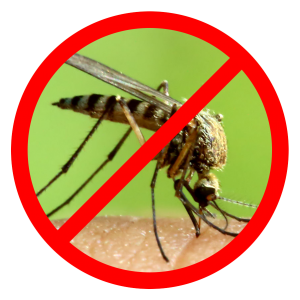Protecting Your Plants During Winter
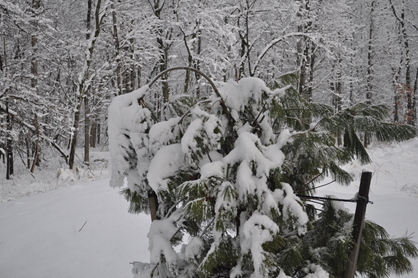
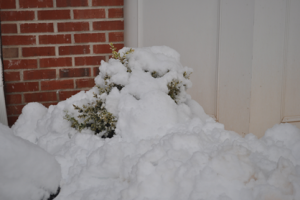 Winters in New Jersey have become more severe in recent years, causing damage to trees and shrubs annually, this why protecting plants during the winter is important. Damage includes bent or broken branches, split trunks, desiccation, dead tips and deer damage. All plants have vascular systems which carry essential nutrients and water throughout the plant. When this system is compromised we can see various stages of damage to your winter landscaping. The weight of snow and ice can bend or crack these systems causing the flow of nutrients and moisture to be interrupted. Freezing temperatures and high winds can cause desiccation injury. These issues can cause discoloration of foliage and may result in poor growth and die back. In severe cases, injury can be seen immediately, while other injuries may not become apparent until later in the season when the plant is under other stress, like from the summer heat or drought.
Winters in New Jersey have become more severe in recent years, causing damage to trees and shrubs annually, this why protecting plants during the winter is important. Damage includes bent or broken branches, split trunks, desiccation, dead tips and deer damage. All plants have vascular systems which carry essential nutrients and water throughout the plant. When this system is compromised we can see various stages of damage to your winter landscaping. The weight of snow and ice can bend or crack these systems causing the flow of nutrients and moisture to be interrupted. Freezing temperatures and high winds can cause desiccation injury. These issues can cause discoloration of foliage and may result in poor growth and die back. In severe cases, injury can be seen immediately, while other injuries may not become apparent until later in the season when the plant is under other stress, like from the summer heat or drought.
Tips for Protecting Plants During Winter
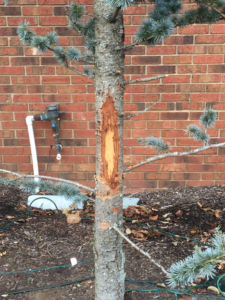 For protecting plants during winter, we recommend an anti-desiccant application for all of the broadleaf evergreens on your property. Desiccation refers to the drying out of a living organism. In your landscape plants, winter desiccation injury occurs when plants lose moisture from the leaves and do not have the ability to absorb water from the frozen soil. This results in drying out and discoloration of the leaves. An anti-desiccant, also called “anti-transparent” is a liquid spray applied to the foliage of evergreen plants to slow the rate at which moisture is lost. The liquid is sprayed onto the foliage until it is completely covered and there is slight run off of material.
For protecting plants during winter, we recommend an anti-desiccant application for all of the broadleaf evergreens on your property. Desiccation refers to the drying out of a living organism. In your landscape plants, winter desiccation injury occurs when plants lose moisture from the leaves and do not have the ability to absorb water from the frozen soil. This results in drying out and discoloration of the leaves. An anti-desiccant, also called “anti-transparent” is a liquid spray applied to the foliage of evergreen plants to slow the rate at which moisture is lost. The liquid is sprayed onto the foliage until it is completely covered and there is slight run off of material.
Next, in protecting your plants during winter, you may wrap your plants with burlap. For small plants you may wrap the burlap over or around the plants and secure it with twine. For moderate to large plants, it’s best to drive stakes into the ground around the plant and then secure the burlap to the stakes by staples. This creates a “screen” or “windbreak” around the plant. Burlap and stakes can be purchased from most garden centers, improvement stores, nurseries and co-ops.
The bark on trees should be wrapped to reduce “buck rub.” “Buck rub” is when a male deer rubs its forehead and antlers on a tree’s bark. These abrasions to the bark caused by the deer may damage the vascular system inside of the trees. Protect the trunk with a commercial tree wrap such as a polyurethane spiral wrap or paper wrap. The wrap should be applied in the fall, and must be removed prior to the spring.
When there is a tremendous amount of snow on trees and shrubs, we recommend you brush or shake off the snow from the branches as soon as possible. Lightly brush off the snow using an upwards motion with a broom. This will reduce the weight on the individual branches, helping reduce bending or breaking. However, do not try and remove ice from your trees and shrubs after an ice storm! This will most likely cause more harm than good to your plants. It is best to let ice melt naturally.
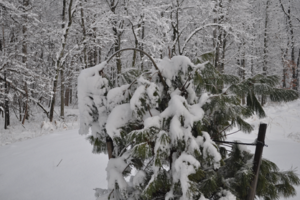 Fertilize your plants each fall will help in protecting plants during winter. The lack of proper nutrition can make your landscape plants more susceptible to winter damage. You should have your plants fertilized regularly to provide the necessary nutrients the plants need for the winter.
Fertilize your plants each fall will help in protecting plants during winter. The lack of proper nutrition can make your landscape plants more susceptible to winter damage. You should have your plants fertilized regularly to provide the necessary nutrients the plants need for the winter.
Water the plants throughout the fall even as it gets cooler out. In the fall, plants are still growing and require good soil moisture to do so. Keeping the soil around the roots moist until the ground freezes will ensure the plants have adequate moisture going into the winter.
Another helpful tip in protecting plants during winter is maintaining 2-3 inches of mulch in your landscape beds. This will insulate the soil and help regulate soil temperatures throughout the year. Please note that mulch should not be piled high on the truck of trees or covering the shrubs. This may lead to decay and damage in the future. For more information please click this link to our blog on proper mulching techniques.
Try and keep deer from feeding on your trees and shrubs during the winter. Have the trees and shrubs in your landscape sprayed with a winter deer repellent application? A treatment of a product called Deer Pro Winter during the fall or early winter can last up to four to five months. In extreme cases, you or your landscaper can wrap your plants with burlap or put up deer fencing to protect plants during the winter. In some landscaping, it may be recommended to have the trees and shrubs all sprayed monthly with a deer repellent throughout the season to minimize deer damage.
Conclusion
The best defense against any problem is a healthy landscape. The healthier and stronger a plant, the better its ability to recover from minor injury. However, even healthy plants can decline due to winter injury. This is why following the tips above and protecting plants during the winter is extremely important. If you are in our service area and have any questions, please don’t hesitate to call us at 908-281-7888.



